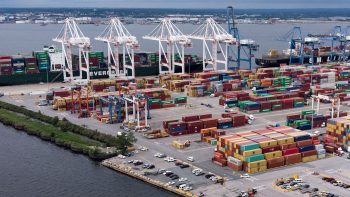
Ex-convicts struggle to find work in Baltimore

In 1994, Baltimore won a federal contest aimed at alleviating poverty. Six cities received federal funds totaling $100 million and a slew of tax breaks for businesses and employers. Baltimore invested the money in job creation and job training for unemployed and underemployed people in the poorest neighborhoods. Those neighborhoods were called Empowerment Zones.
Pete Sevison remembers that about 15 years ago, his father took advantage of a small-business loan made possible through the Empowerment Zones. Sevison runs Petro Express, a fuel delivery company located in Baltimore’s industrial Fairfield area. Sevison is exactly the type of job creator Baltimore hoped to retain. He has 22 employees, and says he starts his drivers at about $15/hour. Baltimore’s minimum wage is $8/hour. Still, last winter Sevison had trouble finding seasonal help. He says the primary issue was that his company delivers to government buildings, so drivers must have clean records.
In cities across the country, having a criminal record can be a barrier to employment. Baltimore drew national attention in April, when protests erupted following the death of a young man named Freddie Gray in police custody. A study released in February by The Justice Policy Institute and the Prison Policy Initiative found Sandtown and neighboring Harlem Park have the highest number of incarcerated people in Baltimore. Every year, Maryland spends $17 million to jail people from Sandtown and Harlem Park.
A Marketplace analysis found the unemployment rate in Sandtown-Winchester is 22 percent. Nancy La Vigne, who directs the Urban Institute’s Justice Policy Center and who has studied prisoner re-entry in Baltimore, finds some laws governing where former inmates can work to be antiquated.
“In many jurisdictions the formerly incarcerated are unable to hold positions as barbers,” La Vigne says. “Even though it’s something they’ve trained for behind bars. Because as a barber or beautician you’re wielding a sharp object.” She finds the rules puzzling, in part because in her capacity as an expert, she sometimes gets calls from employers who are actively seeking employees who have served time.
“In truth, they have found that people with criminal records are really motivated to make good,” La Vigne says.
Other Baltimore businesses have made it part of their mission to hire former inmates. GD Laminates in East Baltimore manufactures things like countertops and cabinets. The company was located in the city’s Empowerment Zone, and owner Greg Dively got tax credits for his employees through the federal program. Another program offered him tax credits for hiring people who had served time. Over the years, he says, the results have been clear.
“I’ve had better success hiring ex-cons then I did with people coming out of the neighborhood,” Dively says. “They have to come to work every day. And they appreciate what I do for them. And at the same time I appreciate what they do for me.”
Dively portrays these hiring practices as pure business pragmatism. He’s become particularly close to one employee, Kevin Parker, who started working at GD Laminates in 1999, after a long stint in prison.
“I would go to war with [Parker,]” Dively says. “He would go to war with me. I’ve made money with the guy. He’s happy. He means something to me. He’s got a wife, got a car, got a kid, got a house. It’s a partnership between me and him.”
The professional loyalty runs both ways. “He was patient with me, prior to learning,” Parker says. “He could have said, ‘Hey, you don’t know that.’ But he didn’t. He said, ‘try it again.'”
Parker keeps the first dollar he made working for Dively in his locker at GD Laminates. It is faded from years of contact with sawdust and chemicals. Parker says it represents the thing he needed most when he left prison: a good place to start.
There’s a lot happening in the world. Through it all, Marketplace is here for you.
You rely on Marketplace to break down the world’s events and tell you how it affects you in a fact-based, approachable way. We rely on your financial support to keep making that possible.
Your donation today powers the independent journalism that you rely on. For just $5/month, you can help sustain Marketplace so we can keep reporting on the things that matter to you.


















